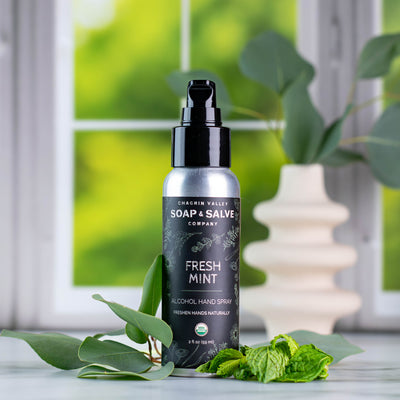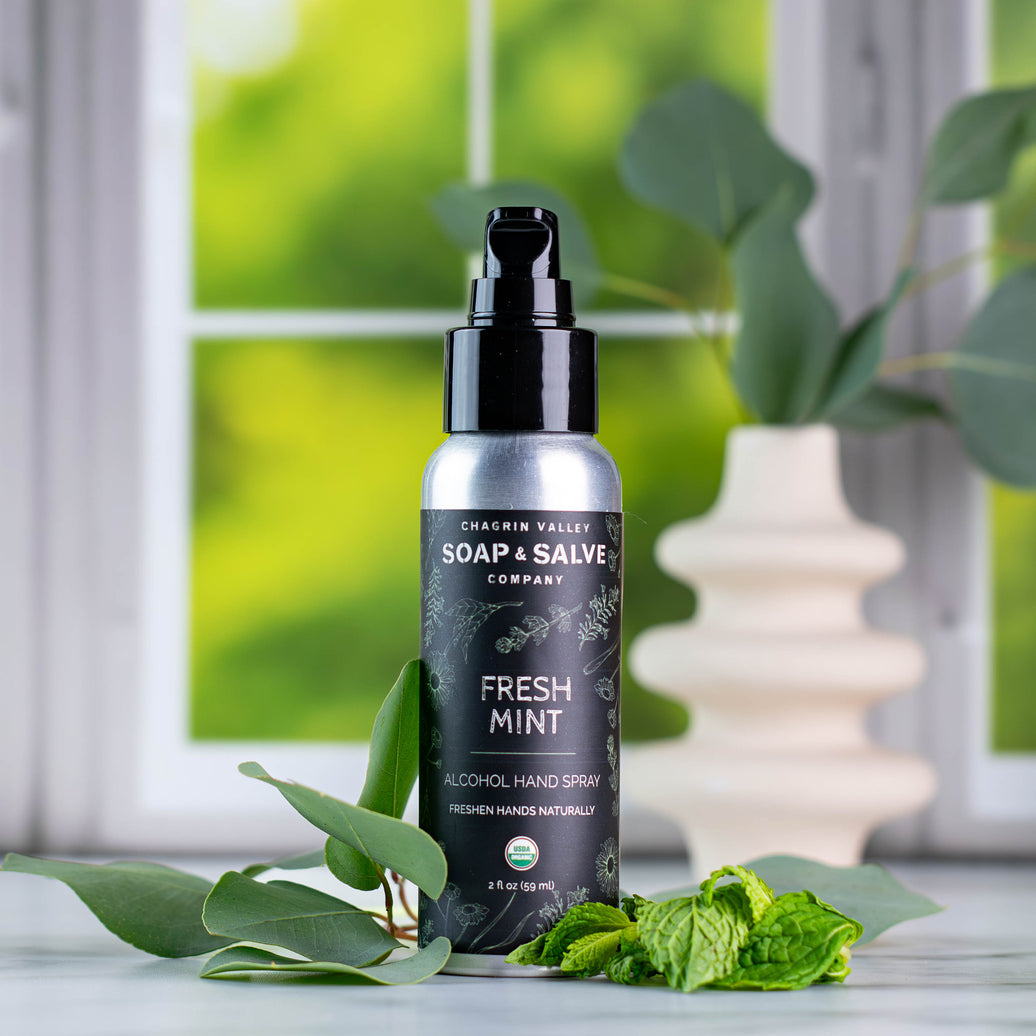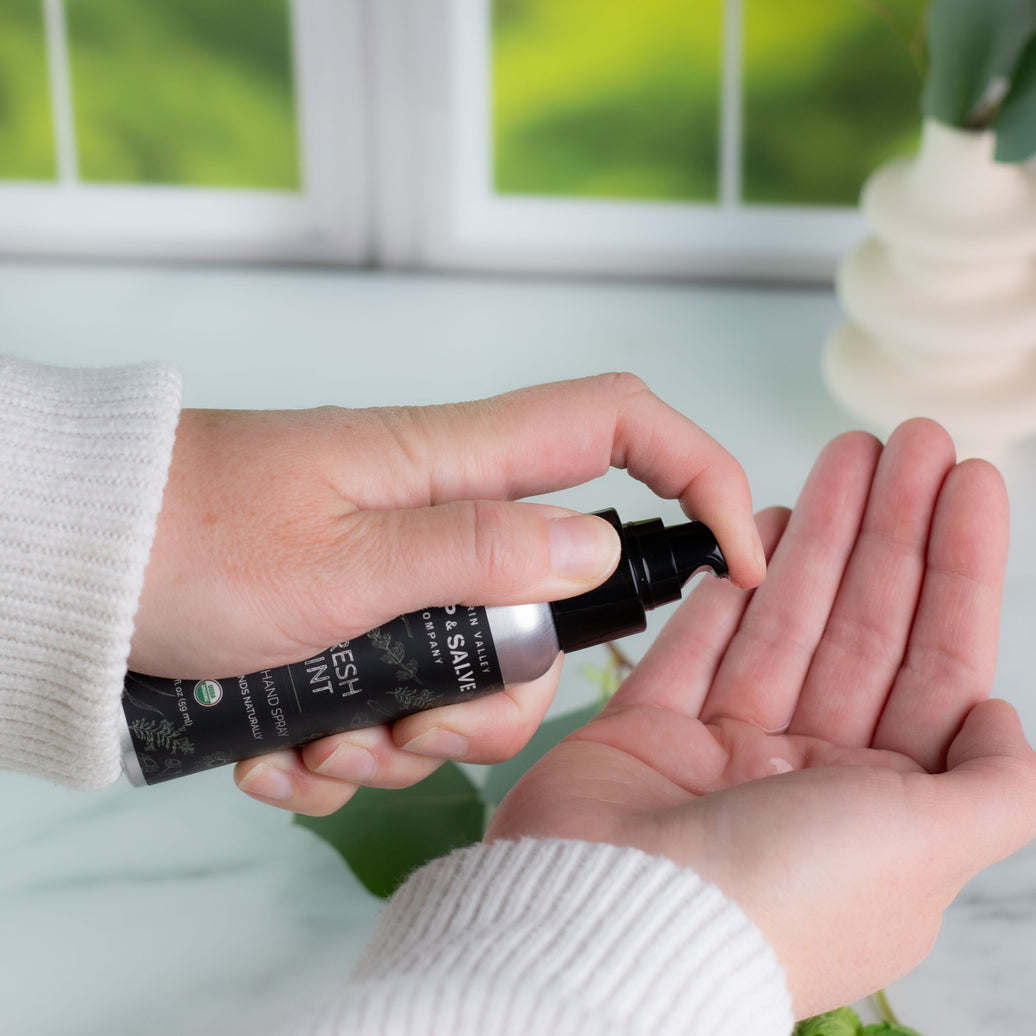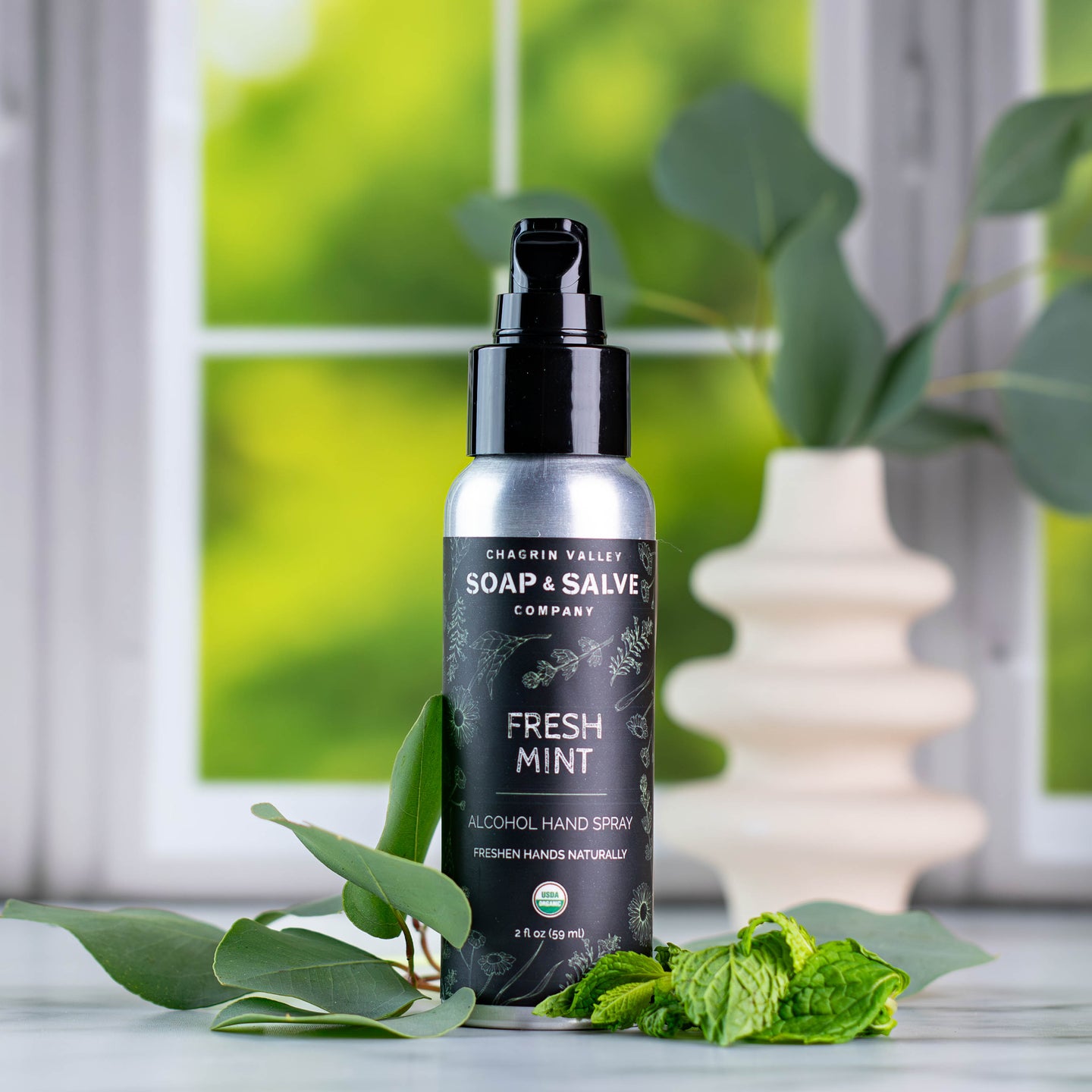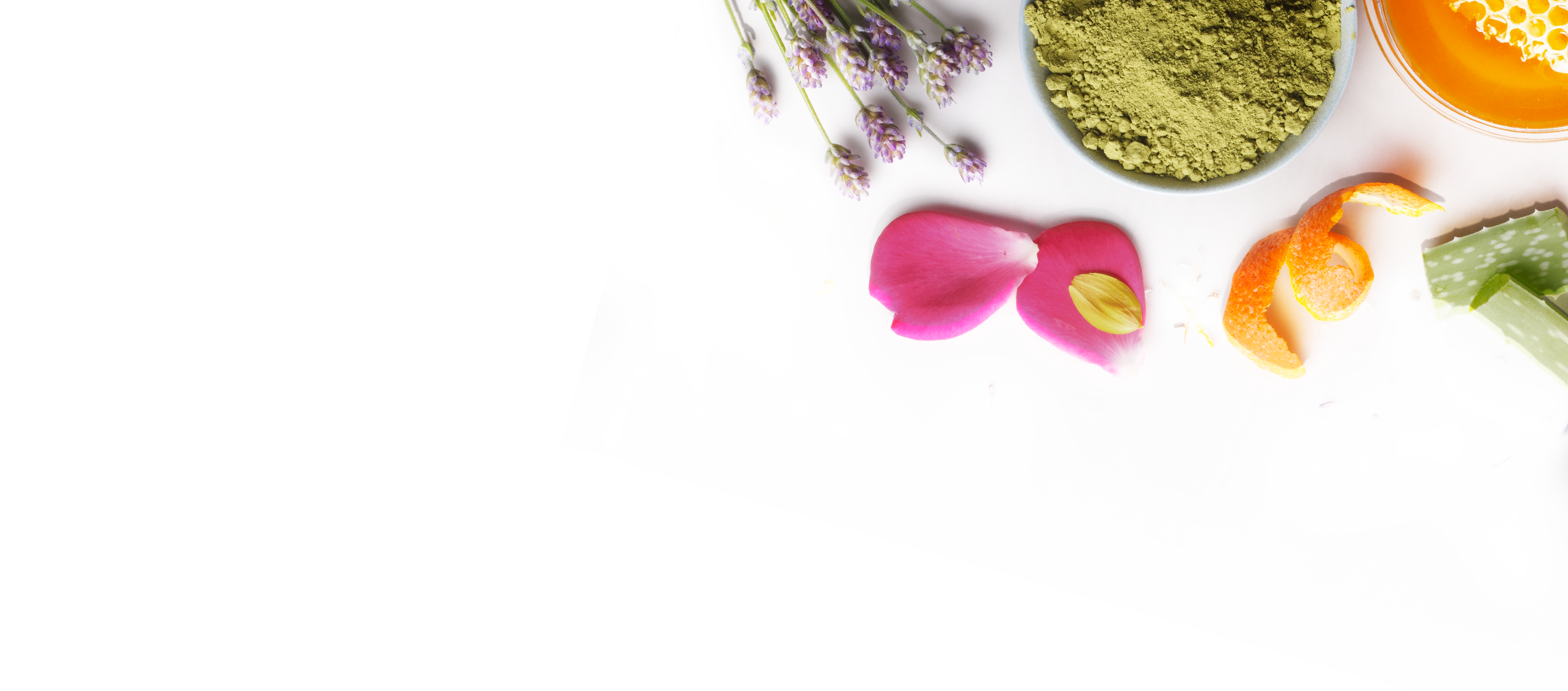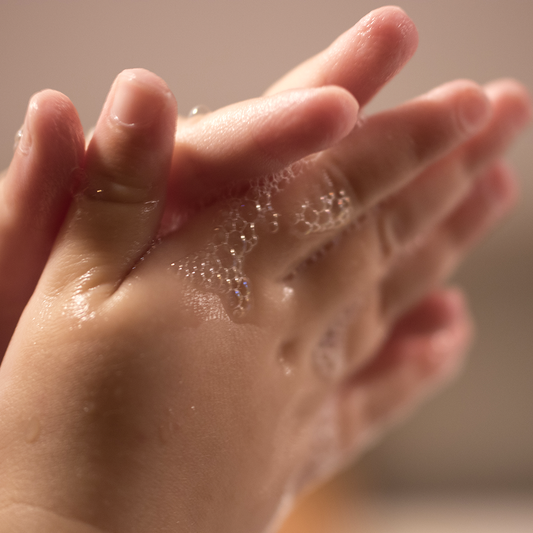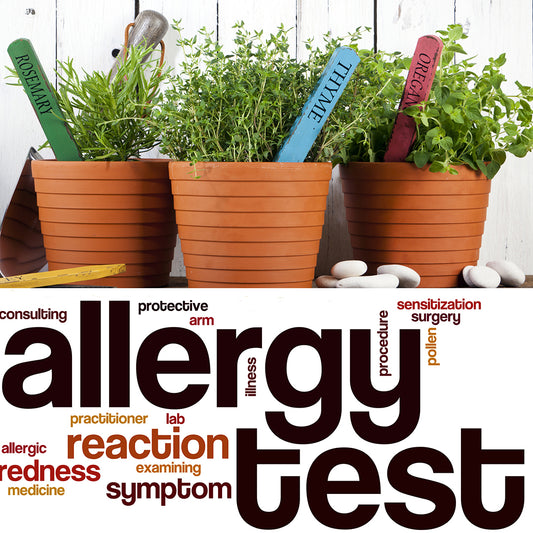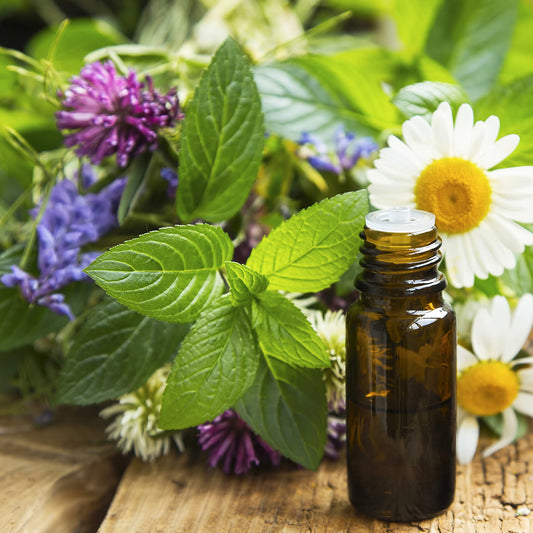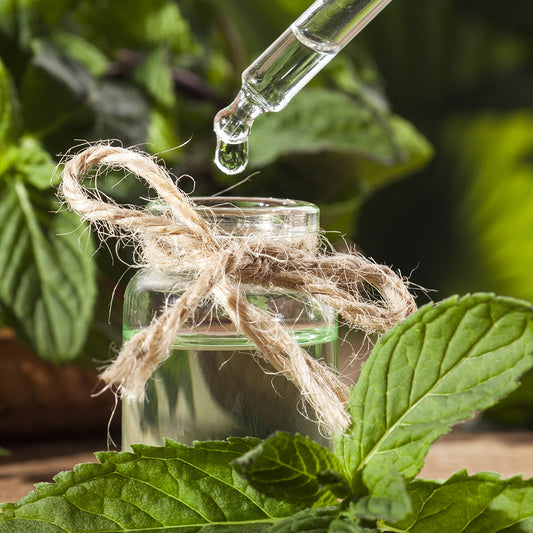
Hand Spray: Fresh Mint
Hand Spray: Fresh Mint
When on the go, maintain good hand hygiene with this minty hand freshener spray containing 75% Organic Cane Alcohol.
- Out Of Stock






Product Overview
Our Fresh Mint Organic Hand Spray uses a simple formula of organic ingredients: 75% ethyl alcohol, witch hazel, glycerin, and essential oils—that's it!
Organic Ethanol, also known as ethyl alcohol, is the same stuff that is in beer, wine, and spirits. We use Organic alcohol made from Certified Organic and Certified Fair Trade Sugar Cane.
Organic Witch Hazel is used in this recipe for its skin-soothing properties.
Organic Vegetable Glycerin is included in this recipe for its moisturizing emollient properties as well as to thicken the solution slightly. The organic glycerin that we normally purchase is derived from organic flaxseed. Depending on availability we may also use glycerin from organic sunflower or palm oils. It is not derived from coconut oil.
Our blend of organic essential oils has been carefully selected for their skin-soothing and protective qualities, which have been valued for centuries in traditional practices."
- Tea Tree: Known for its broad-spectrum benefits and its versatile and protective qualities, tea tree oil is often referred a 'first aid kit in a bottle,' valued for its ability to support skin health and resilience.
- Rosemary, Peppermint, Spearmint, and Eucalyptus: These invigorating oils not only delight the senses with their refreshing scents but also have been used for centuries to support natural defenses and promote healthy resilience.
Packaged in a 2 oz Aluminum Bottle with a Treatment Pump
Wondering why our Hand Spray with 75% alcohol is not called a Hand Sanitizer? The U.S. Food and Drug Administration (FDA) regulates hand sanitizers as over-the-counter drugs (OTC) because they are intended for topical anti-microbial use to prevent disease in humans. Since this product has not been evaluated by the FDA we are not allowed to call it a Hand "Sanitizer."
The Centers for Disease Control and Prevention (CDC) advises that the best way to prevent the spread of infections and decrease the risk of getting sick is by washing your hands with plain soap and water. Handwashing “reduces the amounts of all types of germs and chemicals” on your hands and is generally better at killing certain germs.
A hand spray is helpful when soap and water are not readily available.
**Alcohol-based hand cleansers and sanitizers must always be stored out of the reach of young children, and used only under adult supervision.
Please note that there are currently no drugs, including hand sanitizer, approved by the FDA to prevent or treat COVID-19. A hand spray simply helps decrease the spread by adding another tool to your hand hygiene arsenal.
How To Use
If soap and water are not available, an alcohol-based cleanser can be helpful for hand hygiene.
For Best Results:
- Shake well
- Apply 2 to 3 pumps on the palm of your hand (you want a little puddle in your palm)
- Rubs hands together covering all surfaces including fingers, in between fingers, fingertips, nails and the back of your hands
- Rub hands for about 20 seconds and allow them to DRY. DO NOT RINSE!
Note:
- Hand spray is ineffective if too little is applied or it is wiped off before it has dried completely
- Hand sprays may not be as effective when hands are visibly dirty or greasy.
Other Uses: An nice benefit of a portable alcohol-based spray is that it can be used to wipe down surfaces like door handles, faucets, or shopping carts for a bit of extra cleaning. Just pump out a bit and then wipe the surface with a paper towel or tissue or spray directly on a paper towel and wipe!
Packaged in a 2 oz Aluminum Bottle with a Treatment Pump
If you are concerned about sensitivity do a patch test before using.
**Alcohol-based hand cleansers and sanitizers must always be stored out of the reach of young children, and used only under adult supervision.
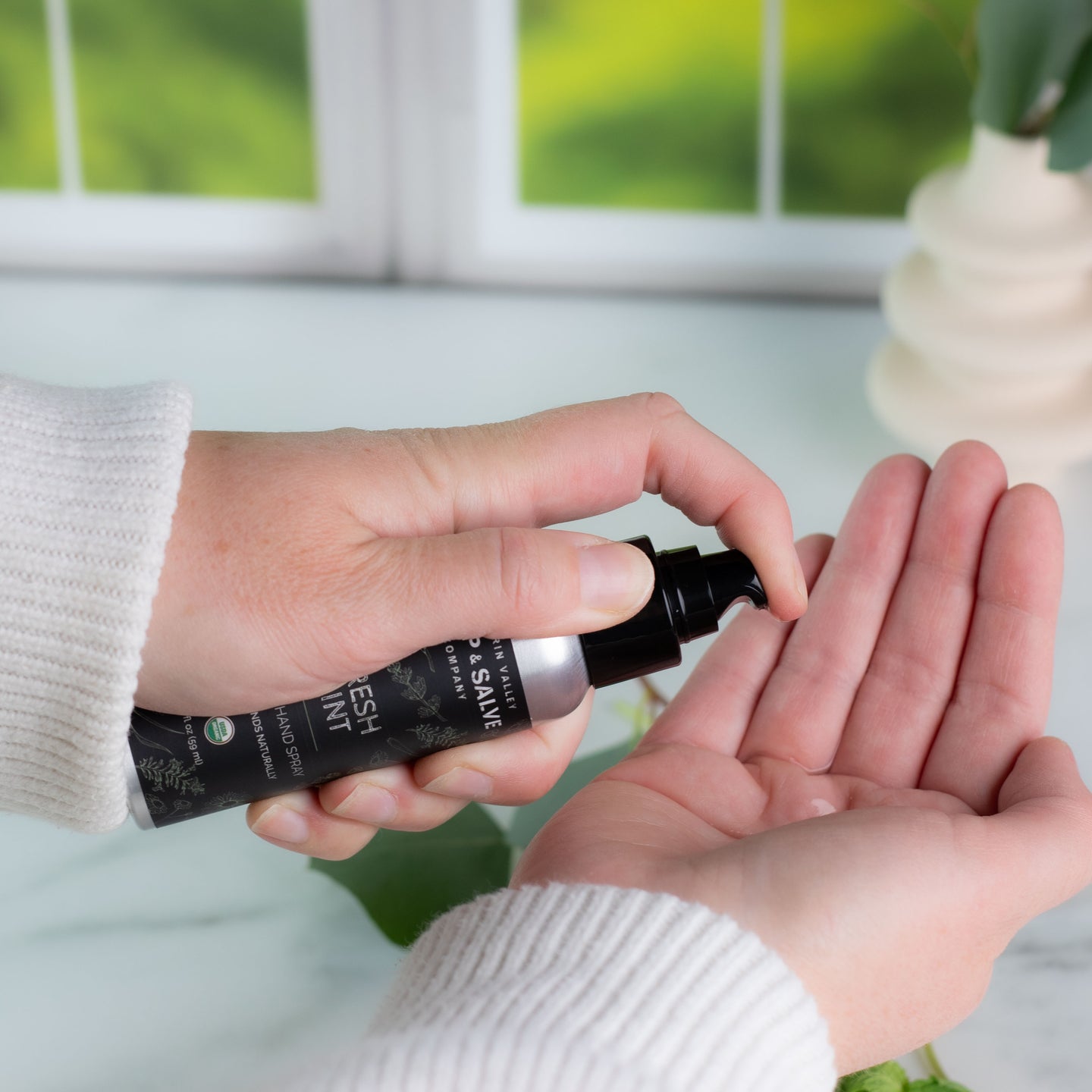
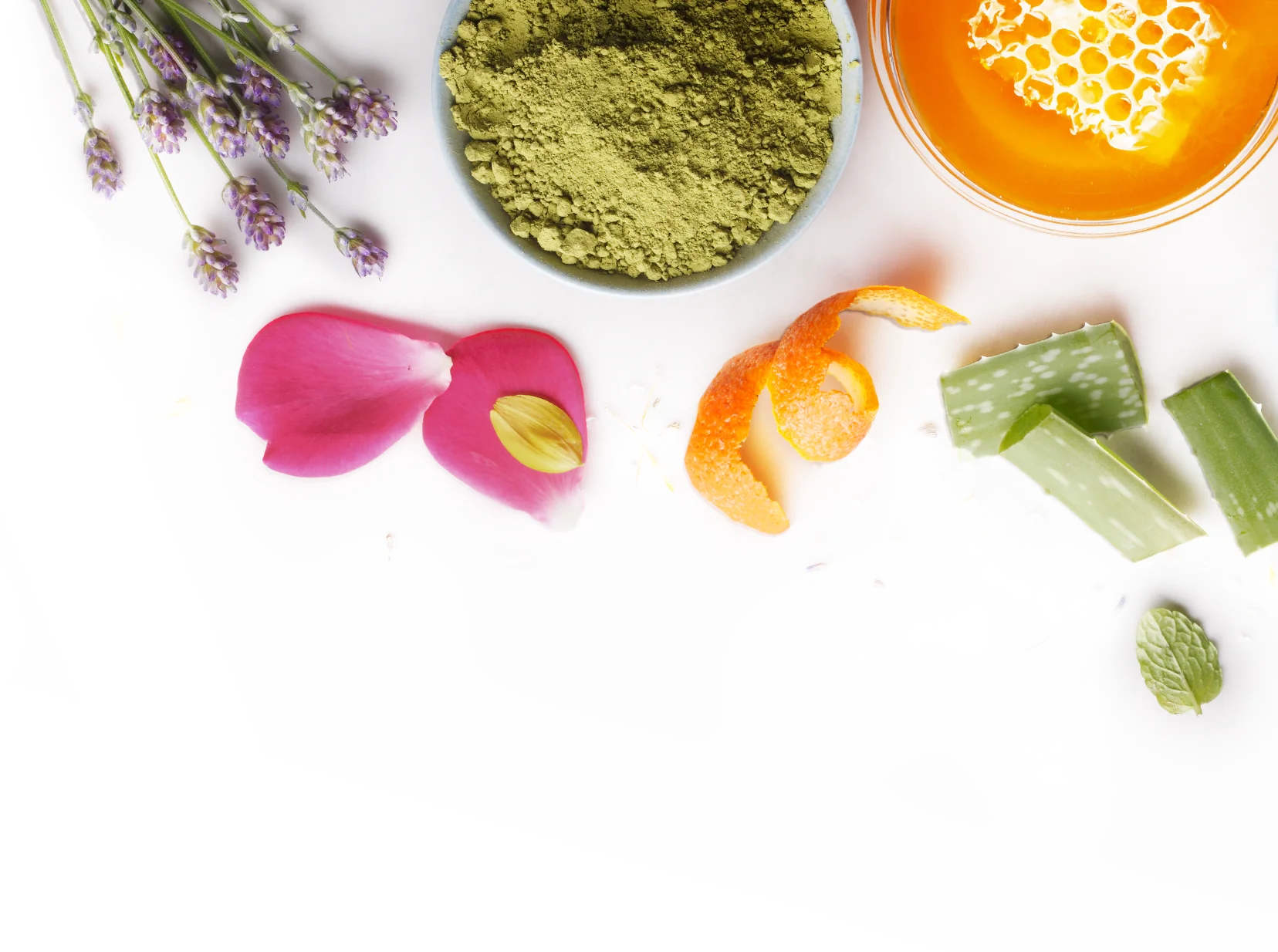
Effective, Feel Good Ingredients
The goal is simple: to Harness the Power & Simplicity of Nature® to cleanse, soothe, heal, and protect your skin and hair!
Our unique formulas rely on moisturizing oils and butters, healing botanicals, and pure essential oils. We choose every ingredient with one end-result in mind….the BEST possible natural skin care for YOU!
Featured Ingredients

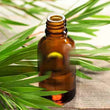
Organic Tea Tree Essential Oil
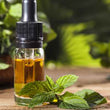
Organic Peppermint Essential Oil
All Ingredients:
Organic Alcohol (Ethanol) content: 75%
Organic ethanol is denatured with essential oils
*Ingredient is Fair Trade Certified
For External Use ONLY
Precautions:
-
Alcohol-based hand cleansers and sanitizers must always be stored out of the reach of young children, and used only under adult supervision.
- Alcohol-based hand sanitizers and cleansers are safe when used as directed. These products contain a much higher alcohol concentration than most hard liquors and can cause alcohol poisoning if swallowed especially in children.
According to the American Association of Poison Control Centers, "Even a small amount of alcohol can cause alcohol poisoning in children." In the short time between January 1, 2020, and April 30, 2020, "poison control centers have managed 7,593 exposure cases about hand sanitizer in children 12 years and younger." Source
For this reason, alcohol-based hand cleansers and sanitizers must always be stored out of the reach of young children, and used only under adult supervision. If you or your child ingests hand sanitizer, call the poison control center or a medical professional immediately. - Alcohol-based hand sprays are flammable. Keep away from fire or open flame.
- Do not use on or near the face. Avoid contact with eyes or open sores.
Frequently Asked Questions
Is Hand Sanitizer as Effective as Natural Soap and Water?
 When you are on the go and soap and water are not available, alcohol-based hand rubs and sprays that contain greater than 60% alcohol can be effective if used properly.
When you are on the go and soap and water are not available, alcohol-based hand rubs and sprays that contain greater than 60% alcohol can be effective if used properly.
While a hand sanitizer is useful in a pinch, it can fail under certain conditions.
Hand sanitizers kill germs but they do not clean dirty hands. Hand sanitizers work best when hands are generally clean and not heavily soiled or greasy.
If hands are wet or sweaty the water can dilute the sanitizer and reduce the effectiveness. Also, if hands are dirty or sticky, the sanitizer will not clean your hands of excess oil or grease to which viruses can also adhere.
"Alcohol is pretty effective at killing germs, but it doesn't wash away stuff," says Dr. William Schaffner.
According to the CDC, "There are important differences between washing hands with soap and water and using hand sanitizer. Soap and water work to remove all types of germs from hands, while sanitizer acts by killing certain germs on the skin.
Although alcohol-based hand sanitizers can quickly reduce the number of germs in many situations, they should be used in the right situations. Soap and water are more effective than hand sanitizers at removing certain kinds of germs like norovirus, Cryptosporidium, and Clostridioides difficile, as well as chemicals."
That said, the CDC recommends using hand sanitizer as a first choice in certain situations such as visiting someone in a hospital or nursing home or when interacting with people who have a weakened immune system. Also when going in and out of stores, doctor visits, etc., a spray of an alcohol-based hand sanitizer on your way in and out decreases the chance of introducing a disease-causing bug or leaving with one.
Not all hand sanitizers are created equal
To kill most disease-causing germs, the CDC recommends a sanitizer that is at least 60 percent alcohol. Beware of "sanitizers," sprays or wipes on the market that contain less than 60% or even contain no alcohol at all.
Any product containing less than 60% alcohol may not work as well “for many types of germs,” and could “merely reduce the growth of germs rather than kill them outright,” the CDC says. There is also some concern that alcohol-based "hand sanitizers" or hand rubs with low alcohol content may actually lead to germ resistance.
Baby wipes will not work, antibacterial wipes will NOT kill viruses, and, NO, neither will your bottle of Jack Daniels Whiskey or Tito's Vodka since they are only about 40% ethanol!
You may also find many hand sanitizers that contain benzalkonium chloride as the active ingredient instead of alcohol. These products, however, are not recommended by the CDC, since “available evidence indicates benzalkonium chloride has less reliable activity against certain bacteria and viruses” compared to alcohol-based sanitizers.
How To Use a Hand Sanitizer
Hand sanitizer works best when used correctly.
A hand sanitizer is ineffective if too little is applied or it is wiped off before it has dried completely
Just putting a little dollop in the palm of your hand and wiping quickly isn't good enough, says Dr. William Schaffner.
"You've got to use enough and get it all over the surfaces. Rub it all over your hands, between your fingers and on the back of your hands."
- Apply the recommended amount to the palm of your hand.
- Make sure to cover the entire surface of both hands and distribute the sanitizer all over, paying special attention to the fingertips
- Rub your hands together until they feel dry (this should take around 20 seconds).
- Do NOT rinse or wipe off the hand sanitizer before it’s dry; it may not work well against germs.
- The picture below is courtesy of the World Health Organization

Hand sanitizer precautions
Keep away from small children! Hand sanitizers can be toxic when ingested, especially by children. “Drinking only a small amount” can cause alcohol poisoning in kids, according to the FDA. If you or your child ingests hand sanitizer, call the poison control center or a medical professional immediately.
Do not get hand sanitizers in your eyes.
Hand sanitizer is also flammable. Though the CDC says that the incidence of fires due to alcohol-based hand sanitizer is “very low,” store hand sanitizer in a safe manner away from flames.
If you are concerned about sensitivity do a patch test before using.
Cleaning products are not a substitute for hand sanitizer
Disinfectant sprays and antibacterial cleaning wipes should not be used as stand-ins for an alcohol-based hand sanitizer. Antibacterial wipes do NOT kill viruses and these products are meant for “hard, nonporous surfaces,” not human skin, according to the Food and Drug Administration (FDA).

Simple Soap Can Help Decrease The Spread of Viruses
Antibacterial Soap: More Harm Than Good
View Answer Page
How To Wash Your Hands To Help Stay Healthy

Regular handwashing is one of the best ways to remove germs, avoid getting sick, and prevent the spread of germs to others.
The CDC (Centers for Disease Control and Prevention) says that for good hand hygiene all you need is plain soap and water.
Clean hands can stop germs from spreading from one person to another and throughout an entire community.
Five simple and effective steps can help reduce the spread of illness so you, your family, your friends and the general public can stay healthy.
Hand washing is a win for everyone . . . except for the germs!
CDC recommends cleaning hands in a specific way to avoid getting sick and spreading germs to others. The guidance for effective hand washing was developed based on data from a number of studies.
Wash often and follow these five steps every time you wash your hands!
1. Wet your hands with clean, warm running water and apply soap.
-
When dealing with cold and flu viruses, as you wash your hands the soap molecule burrows its way into the fatty envelope of a virus and literally pulls the virus apart.
2. Lather your hands by rubbing them together with the soap.
- Soap and friction help lift dirt, grease, and microbes—including disease-causing germs—from the skin so they can be rinsed down the drain.
- Lather the backs of your hands, between your fingers, and under your nails.
3. Scrub your hands for at least 20 seconds.
- Lathering and scrubbing hands creates friction, which helps lift dirt, grease, and microbes from skin.
- The entire hand should be scrubbed. Microbes are present on all of the wrinkly surfaces of the hand, especially under the nails.
- How long are 20 seconds? About the amount of time it takes to hum the “Happy Birthday” song from beginning to end twice.
- The ideal length of time for handwashing can depend on other factors for example, if hands are very dirty or if you are caring for someone is ill.
- Evidence suggests that washing hands for about 15-30 seconds removes more germs from hands than washing for shorter periods.
4. Rinse your hands well under clean, running water.
- If you are using a public restroom use a paper towel to turn off the faucet after hands have been rinsed.
5. Dry your hands using a clean towel or air dry them.
To date, studies have shown that there is no added health benefit for consumers (this does not include professionals in the healthcare setting) using soaps containing antibacterial ingredients compared with using plain soap.
Information is taken from the CDC.gov website
Read our blog "Simple Soap Can Help Decrease the Spread Of Viruses"
View Answer Page
Don't I need to use antibacterial soap to protect my family from germs?
The Short Answer
NO! Adding antibacterial chemicals to soap does not keep your family safe from germs.
I understand why folks (especially those with children) are choosing products labeled “Antibacterial,” hoping to keep their family safe in the war against germs.
According to Janet Woodcock, M.D., director of the FDA’s Center for Drug Evaluation and Research (CDER).
"Consumers may think antibacterial washes are more effective at preventing the spread of germs, but we have no scientific evidence that they are any better than plain soap and water.
In fact, some data suggests that antibacterial ingredients may do more harm than good over the long-term.”
Simply washing your hands with old-fashioned natural soap and water rids your skin of most fungi, bacteria, and viruses. Soap does not kill germs, it surrounds them and carries them away.
The Long Answer
Please read our blog: Antibacterials: More Harm Than Good!
View Answer Page
What are essential oils?
What Are Pure Essential Oils?
Have you ever enjoyed the scent of a fragrant flower or herb? The fragrance comes from potent, aromatic compounds called essential oils found in the flowers, stems, seeds, bark, roots, fruits, and other parts of plants. It often requires several pounds of a plant to produce a single bottle of essential oil.
Essential oils not only give plants their unique scents but also help lure plant pollinators and protect plants from insects and other predators.
The chemical composition of essential oils may provide valuable psychological and physical aromatherapeutic benefits for some people.
It is important to note that to be a true essential oil, the oil must be isolated from the plant material by physical means only. Essential oils are NEVER extracted using solvents.
Although synthetic fragrances or "nature identical" oils are available at a much lower cost, only natural plant essential oils will provide any aromatherapeutic benefits.

What Are Essential Oils (Much more detail)
How Essential Oils Are Extracted
Why We Use Only Real Plant Essential Oils?
If you are pregnant or under a doctor's care for any medical condition, please consult your healthcare provider before using essential oils.
Pregnancy & Children: We do not provide information on the safety of essential oils during Pregnancy or for use in Children because the available information is very ambiguous and often contradictory. If you’re interested in using essential oils during pregnancy or with young children please do your own research and consult your doctor, midwife, or health care professional before use.
View Answer Page
